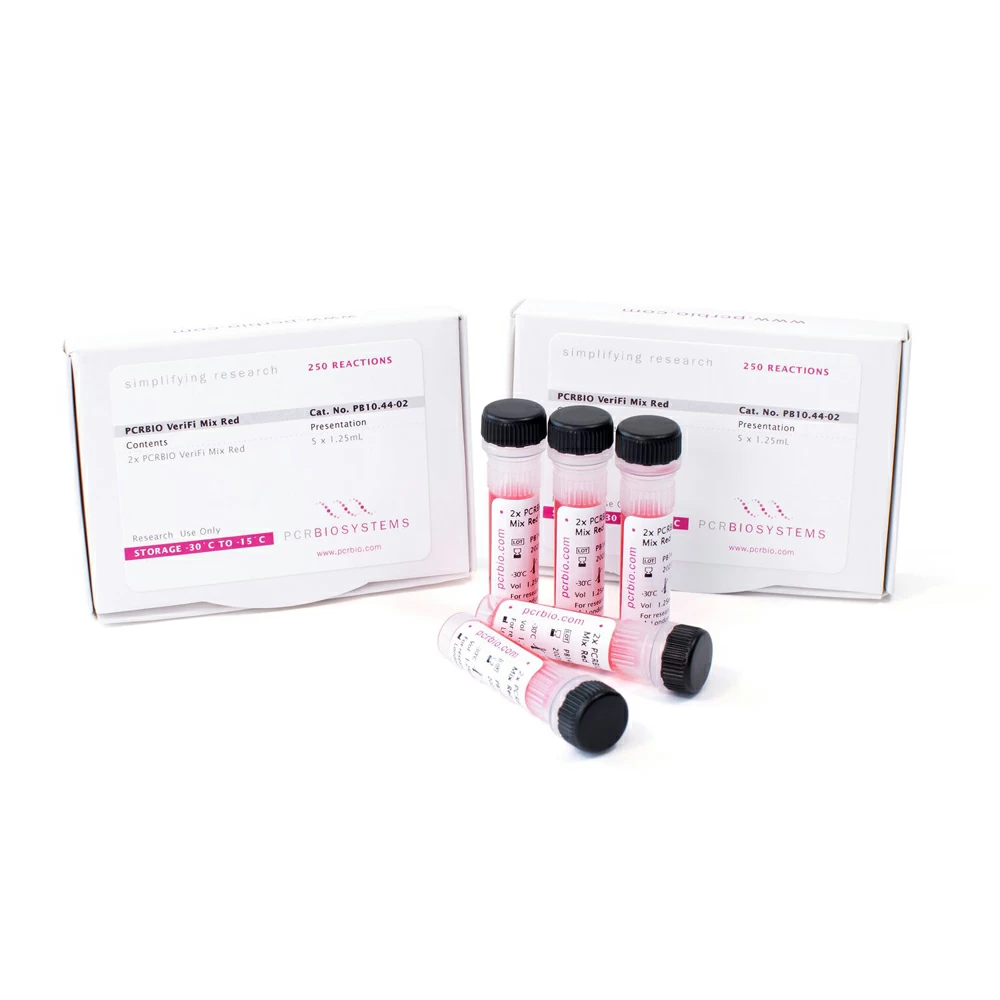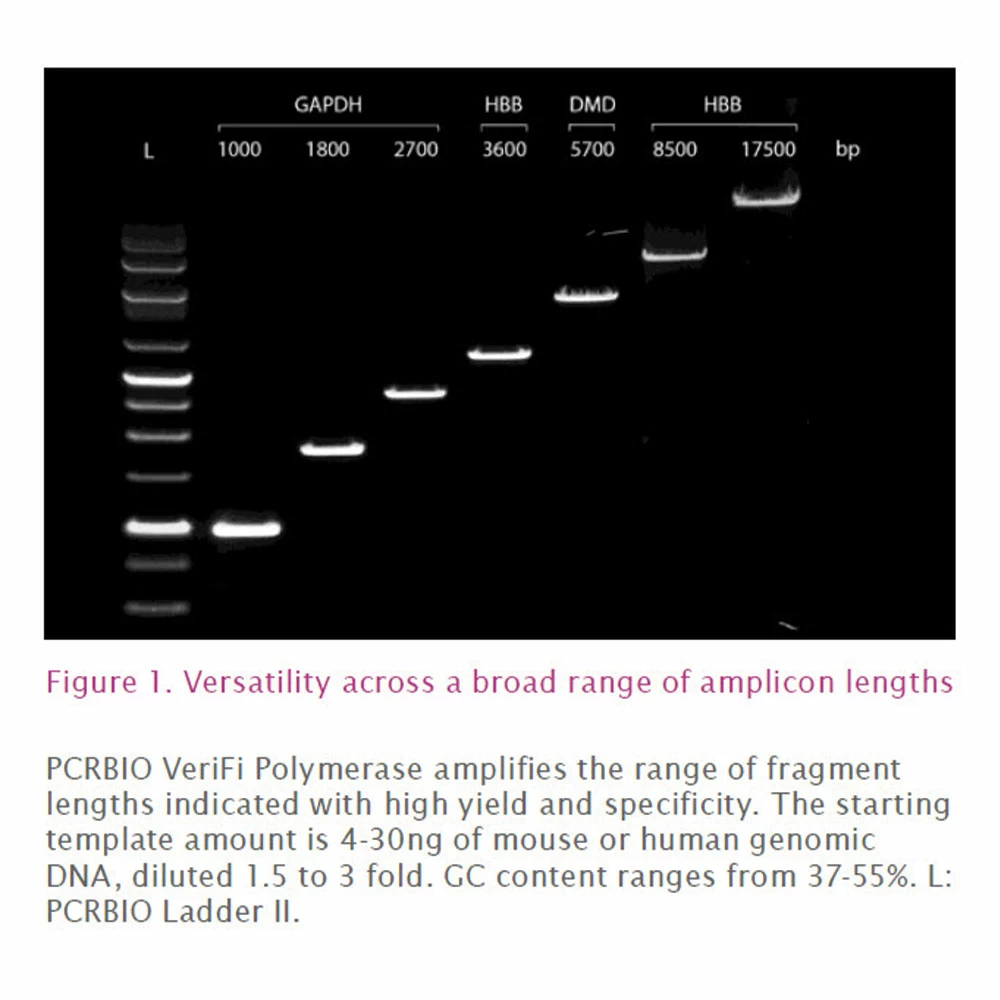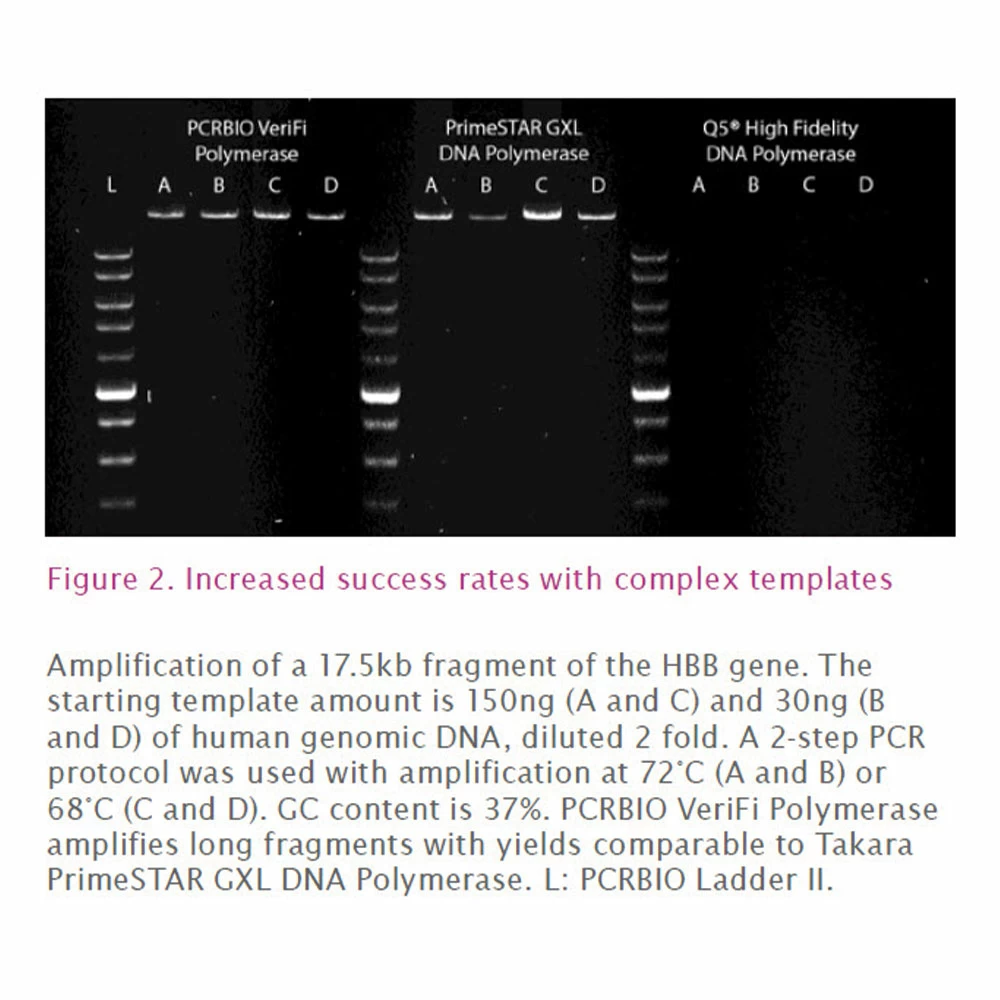Cat #: 17-308B
PCR Biosystems PB10.44-05 VeriFi™ Mix Red, Long Range and High Fidelity, 500 Reactions/Unit







Cat #: 17-308B
PCR Biosystems PB10.44-05 VeriFi™ Mix Red, Long Range and High Fidelity, 500 Reactions/Unit
Long Range and High Fidelity
500 Reactions/Unit
Brand: PCR Biosystems- 100x higher fidelity than Taq DNA polymerase
- Red dye enables direct loading and tracking during agarose gel electrophoresis
- High yields under standard and fast PCR conditions (10-30s/kb)
- High temperature cycling for reduced GC bias
- Generates blunt-end PCR products

Size
Color
$1,319.82
Login To Access Your Institutional Price
Long Range and High Fidelity
500 Reactions/Unit
Brand: PCR Biosystems- 100x higher fidelity than Taq DNA polymerase
- Red dye enables direct loading and tracking during agarose gel electrophoresis
- High yields under standard and fast PCR conditions (10-30s/kb)
- High temperature cycling for reduced GC bias
- Generates blunt-end PCR products
PCRBIO VeriFi™ Mix Red is a convenient high fidelity 2x mix designed for PCR applications where greater sequence accuracy is required, together with improved PCR success rates of long and challenging templates. The inclusion of a red dye enables direct loading and tracking during agarose gel electrophoresis.
PCRBIO VeriFi™ Mix Red contains the engineered and highly processive PCRBIO VeriFi Polymerase, developed for fast and versatile high fidelity PCR. The enzyme is derived from Pfu DNA polymerase for its 3’-5’ exonuclease (proofreading) activity. Several proprietary mutations significantly improve DNA binding and processivity, resulting in shorter extension times (10-30s/kb), higher yields and the ability to amplify longer and more difficult targets, including eukaryotic genomic templates in excess of 17.5kb.
| Packaging | 10 x 1.25 VeriFi Mix Red |
|---|---|
| Reactions | 500 x 50ul Rxns/Unit |
| Storage | Between -30 and -15°C |
| Compare To | NEB Phusion® High Fidelity Polymerase, NEB Q5® High-Fidelity DNA Polymerase, Invitrogen™ AccuPrime™ Pfx DNA Polymerase, KAPA HiFi PCR Kit, |
PCRBIO VeriFi Polymerase is available in two formats. One format contains the enzyme (2units/µl) with a separate 5x VeriFi buffer and the other format contains the enzyme and buffer conveniently premixed as a 2x Mix. Additionally, the 2x Mix is also available with a red dye giving further convenience for direct loading and tracking during agarose gel electrophoresis. All of our formats contain the required reaction components for PCR except for primers, the template and PCR grade water.
PCRBIO VeriFi Polymerase has an enhanced processivity relative to PCRBIO HiFi Polymerase, resulting in shorter extension times (10-30s/kb), higher yields and the ability to amplify longer (up to 17.5kb) and more difficult targets. PCRBIO VeriFi Polymerase also has a higher fidelity than PCRBIO HiFi Polymerase. Unlike PCRBIO HiFi polymerase, PCRBIO VeriFi Polymerase is available as a convenient 2x ready mix with the option of a red dye for direct gel loading, saving time during reaction setup and analysis.
PCRBIO VeriFi Polymerase has a very low error rate, with a fidelity approximately 100 times higher than wild-type Taq DNA polymerase.
Yes. If you’re working from bacterial colonies use a sterile tip to pick a colony and re-suspend into the 50µl PCR reaction. If working from liquid culture add 5µl of overnight culture to the final mix. Follow the general protocol and increase the initial denaturation time to 10 min at 95°C.
PCRBIO VeriFi Polymerase doesn’t contain hot-start technology however it does have an intrinsically low activity at low temperatures, which are much lower relative to a Taq Polymerase without the hot start. This means it can be used for some multiplex applications. When first performing multiplex PCR, we recommend running an annealing temperature gradient from 55°C to 65°C. The annealing temperature that results in the best specificity should be used in subsequent experiments. Fast cycling conditions should not be used for multiplex PCR. We recommend a 90 second extension time to begin with and this time may be extended to increase yield. For multiplex reactions, the reactions should be set up on ice or cooling blocs from start till finish. Primers must be designed carefully to avoid overlapping sequences as much as possible while maintaining diverse amplicon lengths that can be easily analyzed with your end-detection method.
Enjoy our products? Leave a review and let us know.


 What are the differences between the different formats of PCRBIO VeriFi Polymerase?
What are the differences between the different formats of PCRBIO VeriFi Polymerase?